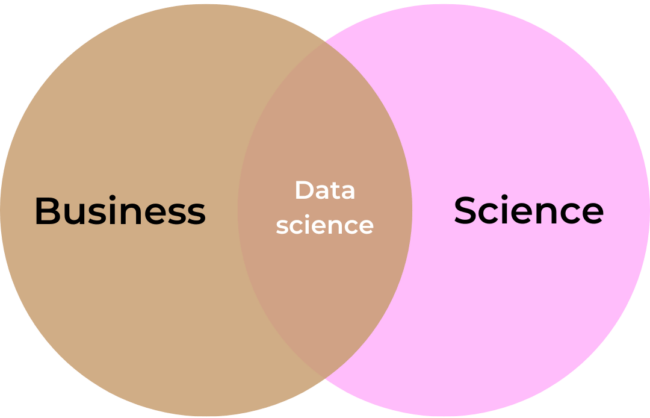
Data science:
in the sweet spot between science and business
Science is everywhere. The same goes for data in your organization. From studying click behavior on your website to recognizing patterns in customer queries: more and more companies are using data analysis to guide their decision-making process. Your organization is certainly also gathering a carload of information. But how exactly do you go from big data to relevant learnings for your teams? Enter data science! A data scientist creates order in the data chaos and zooms in with microscopic precision on business trends that are interesting for your company. Keep reading and discover how we defined data into a simple definition and the three advantages that come with it.

What is data science?
Time for a dummyproof definition
The name gives it away. Data science can best be described as a form of data processing, using scientific analysis methods to spot connections in huge amounts of company data and make predictions. In other words, the data scientist is the scientist in your organization who comes up with new business insights. But don’t expect static research reports with miserable bibliographies. A data scientist develops machine learning algorithms and continuously feeds these models with new data to make even sharper predictions.

#1 Process complex amounts of info and pinpoint key data
Data flows into your business through a variety of channels. Often even unconsciously. Think of all the questions your customer support receives or the purchase combinations of customers. There is potential gold in this. The challenge lies in anticipating the speed at which the sea of unstructured data arrives. Thanks to sophisticated data science techniques, you can more easily organize and analyze big data to answer concrete business questions in a targeted way.
#2 Put your finger on business trends and predict the future
A data scientist is more than a kind of traffic controller at a data intersection. Through data science you can recognize trends in new and historical data and make predictions about customer behavior or business trends. Moreover, data prediction lends itself perfectly to HR issues. Think of staff turnover that is related to various factors, such as employee satisfaction, cooperation and commitment. When you aggregate and analyze multiple data sources, including internal surveys, KPIs, compensation and data from collaboration tools like Slack or Microsoft Teams, you can more accurately predict who is prone to leave your company and adjust your retention policies accordingly.


#3 Make informed and inspired strategic decisions
Data is purely factual, which means that as a manager you can rely on it 100% in your decision-making. Moreover, you are able to use data predictions to futureproof your strategy (for real). And data science also provides the necessary guidance for the creative cockpit in your organization. Thanks to data, you can better understand the preferences of your target group, allowing your (digital) marketers to perfectly align their campaigns. And having great people skills as a data scientist can help even more to bring this assignment to succes. You can already feel it coming: data science is everywhere.
Do you need a data scientist for your project or do you have questions about our profiles? Book a call with Jannes Baert.
Or are you a curious data scientist looking for a challenge? Check the vacancy!